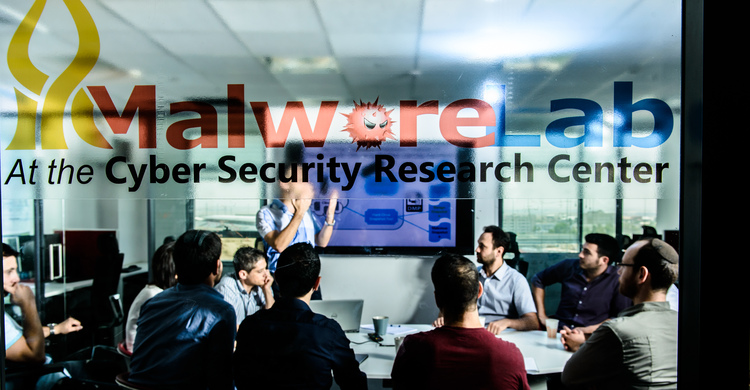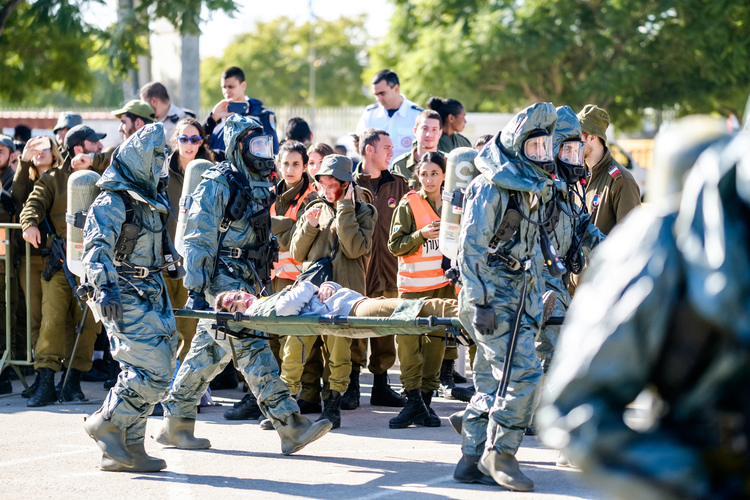Home to internationally renowned cyber-security researchers, our expertise is sought after by companies, governmental organizations, and academic partners around the globe, and our technologies protect both citizens and critical infrastructure from increasingly sophisticated cyber threats.
We've also leveraged our region's unique security challenges into a testing ground for homeland-security research, with our researchers' innovations in such areas as remote sensing and surveillance currently in operation by Israel's military. The relocation of the IDF's intelligence units — including some 5,000 of its most elite personnel — to our adjacent Advanced Technologies Park by 2023 underscores BGU's leading role in the homeland-security space and will open new opportunities for research aimed at addressing Israel's and the world's present and future defense needs.
Israel's Cyber Capital
With more than 1,500 students and 40 full-time faculty, our Department of Computer Science is the fastest-growing computer science department in Israel and a trailblazer in computer science education and research. Acknowledged as a national leader in the fields of AI, networks, cryptography, and cyber security, its scientists have helped develop technologies for machine learning-based threat detection, privacy-preserving algorithms, malware and security risk analysis, and much more. Meanwhile, our Department of Software and Information Systems Engineering — the largest one of its kind in Israel — is considered the go-to place for cyber education and a leader in algorithms, secure systems, and data-science research. It is also the academic partner of BGU's Deutsche Telekom (DT) Innovation Laboratories, whose more than 100 scientists, students, and technical staff anchor the South's cyber ecosystem, creating a magnet for both startups and multi-national companies in the field.
Selected by Israel's Cyber Bureau to create a national cyber center in 2012, BGU established the Cyber Security Research Center, which facilitates applied research in big-data analytics, AI, and cyber security. The Center includes the Advanced Cyber Security Research Laboratory, the Internet of Things Laboratory, the Adversarial Artificial Intelligence Laboratory, and the David and Janet Polak Malware Lab, which together work to advance cyber security as a scientific discipline, improve Israel's competitive edge in the cyber industry, and strengthen Israel's security by means of new technologies. BGU is also one of the main sponsors of the annual Cybertech Conference, which brings leading international companies, startups, private and corporate investors, venture-capital firms, and researchers together for the study and pursuit of innovative solutions in cyber defense.

A State of Readiness
BGU's innovative work in the field of security also extends to the protection of populations, borders, infrastructure, and information from non-state actors, natural disasters, and even industrial accidents. With specialized expertise in the fields of detection, prevention, protection, and damage control, our Homeland Security Institute is home to scientists undertaking both basic research and work on advanced applications. Slated for a new home in the Diane and Guilford Glazer Institute for Homeland Security on our North Campus, the Institute will bring scientists from such diverse fields as engineering, psychology, medicine, and geography together under one roof, where they can work on holistic solutions to homeland-security challenges. The Institute also collaborates with the Center for Quantum Information Science and Technology, whose researchers are developing technologies capable of detecting the presence of terror tunnels underground, for example, or ensuring hack-proof communication and ultra-fast computing capabilities. It is also aided by The Weiss Family Laboratory for Nanoscale Systems, which develops advanced devices, chips, and sensors on a nanoscale, and the Unit of Electro-Optical Engineering, where research in the emerging electric-optics and photonics fields includes projects on satellite tracking, remote sensing, and augmented-reality night-vision goggles.
Our world-renowned work in robotics further augments our homeland security research capacities, resulting, for example, in a robot that can run on water at high speeds like lizards, and be used for search-and-rescue applications in which both crawling and swimming are required. In the Department of Electrical and Computer Engineering, scientists have developed a laser-based defense system for downing the next generation of attack drones, catalyzed by the need to down explosive balloons sent from the Gaza Strip. The system is also safe for urban environments such as airports, and can provide complete coverage without endangering pilots or passengers.

Finally, BGU's interdisciplinary PREPARED Center for Emergency Response Research promotes research, teaching, and training in the fields of disaster and emergency preparedness and response and risk communication. The creator of a standard instrument for assessing community resilience, the Center provides evidence-based data and recommendations for leaders and policymakers on emergency-management plans, preparing health services for emergencies, the use of media in disasters, and the special needs in emergencies of populations with disabilities.
A Citadel of Security Research
To enhance our existing capacities in fields critical to Israel's strength and safety, and to provide defensive technologies to allies around the world, BGU plans to establish a new faculty or school of technology in the coming years. Along with the full range of existing undergraduate degrees, the faculty will offer novel academic programs in cyber, as well as minors and courses in data or computer science for students of the social sciences and humanities. In this way, we can mobilize the full force of our University's expertise toward maintaining Israel's defensive edge and protecting civilians everywhere.
Help us develop solutions for a stronger, safer world >>
